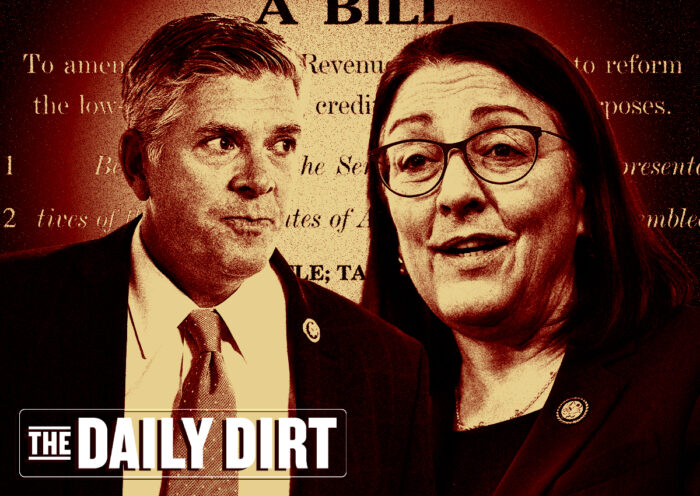LIHTC Bill Reintroduced Ahead of Reconciliation


Will Trump’s “big beautiful bill” include an expansion of a key source of housing financing?
The U.S. House of Representatives on Thursday approved the Senate version of the budget blueprint, which means lawmakers now must get to work on actual legislation to achieve (at least) $4 billion in spending cuts, $5 trillion in tax cuts and other priorities laid out by the Trump administration.
Now, lawmakers are introducing a measure in the hopes of it being included in the reconciliation legislation. The bill would expand a significant source of affordable housing financing, but its chances may be threatened by Trump’s expected tax cuts and proposed ways to make up for lost tax revenue.
On Tuesday, Democrats and Republicans in the House reintroduced the Affordable Housing Credit Improvement Act — a measure first proposed in 2016 that has repeatedly garnered bipartisan support but failed to cross the finish line. The Senate is expected to introduce its version later this month, and proponents hope for it to be included in the reconciliation legislation.
The Act would expand low-income housing tax credits — a dollar-for-dollar tax credit that developers sell to investors to raise capital for affordable housing projects — in a few key ways. One would permanently increase how much of the so-called 9 percent credit Congress can allocate. Another would change the 50 percent rule for 4 percent credits, which requires that at least half of the financing for a project using these credits must come from private activity bonds. The measure would bring that threshold to 25 percent.
Novogradac estimates that the bill could result in an additional 1.6 million rental homes being built in the U.S. over the next 10 years, mostly due to the 50 percent rule change. California would see the most units at 258,000, followed by Texas at 126,600. New York would add 95,000, and Florida, 88,400, per Novogradac. The analysis also provides a breakdown of estimated federal, local and state tax revenue that would result from the projects.
At the same time, there’s been concern that the reconciliation legislation will repeal the tax cuts or eliminate the tax-exempt status of private activity bonds (meaning they are far less attractive) to make up for the tax breaks Republicans want. These concerns were also raised ahead of the 2017 tax law. The Congressional Budget Office estimates that repealing the tax credit would increase federal revenue by $69 billion between 2025 and 2034. That number is $43 billion for the private activity bond change.
Will the bipartisan support for the Affordable Housing Credit Improvement Act be enough to get it passed this year? Or will efforts to make up for the revenue lost through tax breaks prevent it from moving forward? Will the reconciliation legislation get rid of the tax-exempt status for private activity bonds? We’ll see!
What we’re thinking about: Who do you think is best positioned to win a casino license? With Saks now out of the running, 10 contenders remain. Send a note to kathryn@therealdeal.com.
A thing we’ve learned: ABBA’s “Super Trouper” is about a specific brand of spotlight, and not, in fact, someone who is part of various troupes.
Elsewhere in New York…
— A helicopter crashed into the Hudson River on Thursday, killing the pilot, two adults and three children, Gothamist reports. Police say the helicopter took off from the Downtown Manhattan Heliport just before 3 p.m.
—The City Council on Thursday approved a resolution authorizing Speaker Adrienne Adams to sue the mayor (on behalf of the whole council) over his decision to let ICE agents operate on Rikers Island, the New York Daily News reports. This week, First Deputy Mayor Randy Mastro signed an executive order allowing ICE agents to use an office at Rikers Island to investigate undocumented immigrants accused of serious crimes. The Council fears the agency’s work will go further and may violate a 2014 sanctuary city law that barred civil immigration enforcement on the island. The Council is also looking at the legality of Mastro signing the order.
— The MTA has reached an agreement with the Trump administration to keep congestion pricing in place until at least October, CBS News reports.
Closing Time
4/10/25
Residential: The priciest residential sale Thursday was $28.6 million for a 9,886-square-foot condo unit at 35 Hudson Yards.
Commercial: The most expensive commercial closing of the day was $18.7 million for an 11,900-square-foot, mixed-use property at 414 West Broadway in Soho.
New to the Market: The highest price for a residential property hitting the market was $49 million for a 9,016-square-foot house at 9 East 82nd Street on the Upper East Side. Stefani Berkin of R New York has the listing.
Breaking Ground: The largest new building application filed was for a 504,527-square-foot proposed warehouse at 12-18 38th Street in Long Island City. Jennifer Cheuk of Stephen B. Jacobs filed the permit on behalf of Prologis.
— Matthew Elo




